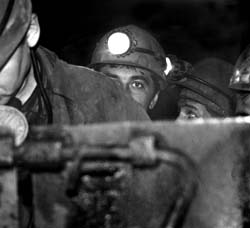Miners and the Budget

The Ukrainian coal lobby has formulated its demands to the government and parliament. Last Wednesday the Congress of the Trade Union of Coal Industry Workers (TUCIW) opened in Kyiv, with Union President Viktor Turmanov making it quite clear what Ukrainians expect from their state. He did not rule out the possibility that if preliminary agreements concluded at the congress remain only promises, Khreshchatyk will hear again the rattle of miners’ helmets. To make it more convincing, the union released information that at present it unites 90% of all coal industry workers.
First, the TUCIW demanded that the government agreed to increase the total amount of state subsidies to the industry to 3.5 billion hryvnias. It is worth mention that the already approved draft budget for 2004 allots 2.9 billion for this purpose. Chairman of the Verkhovna Rada Committee on Coal Industry Andriy Kliuyev promised the congress to secure the subsidies volume on the level of 3-3.5 billion and was greeted with scattered applause. Simultaneously, the parliament’s chief energy expert recognized that “a political war is currently going on over the budget and winning it will take much effort.”
In addition, the TUCIW demanded that the cabinet pay miners the 795 million hryvnias they “forgot” to pay them from last year’s budget. It was proposed to channel this money to paying wage arrears, which at present amount to 1.2 billion hryvnias. Minister for Fuel and Energy Serhiy Yermilov promised to solve this problem by the end of 2004. The trade union stated its readiness for compromise on the condition that all current wages be not only paid in the near future but also be raised. At present, the average wage of a Ukrainian miner is 632 hryvnias. In Ukraine’s incomes rating this profession occupies eighteenth position.
Viktor Turmanov called the quality of state management in the industry insufficient and in this connection demanded the government consider the question of renewing the Ministry for Coal Industry. This idea has been actively debated in the government in the last few months, but its chances seem rather low. Minister Yermilov is a supporter of a complex approach to regulating the fuel and energy complex. Mr. Kliuyev, who represents the thermoelectric power station business, also spoke for viewing the coal industry problems within the context of the energy system in general. This made his warning that Enerhorynok’s debt to the fuel and energy complex, which has recently increased dramatically, will block payments to the mines selling coal to thermoelectric stations sound even more to the point.
The congress was not without emotions. Dzerzhynsky miner Oleksandr Herasymov at the rostrum probably decided to tell everything he had on his mind to the presidium face to face. Obviously he was trying to restrain himself from using strong language. “You, presidents and ministers, make promises you never fulfill. I’d like to switch places with you, so you went down to the coalface. Maybe then you’d keep your promises,” he said, looking into the confused faces of the government and parliamentary leaders. In his words, the prestige of the mining profession among the young has declined dramatically, and if a young miner stays at a mine for three months this is considered a record.
In general, the TUCIW congress demonstrated the organization’s increased lobbying potential. Further evidence of this is the approval of a new statute making power in the union become more centralized. After blatant failure in last year’s budget process, the coal barons realized that it is time to intensify their efforts. Understanding that it is dangerous to make such people nervous, representatives of the authorities at the congress were very compliant, promising the most support possible. They know perfectly well what miners’ strikes and marches on Kyiv as presidential elections approach would mean.






